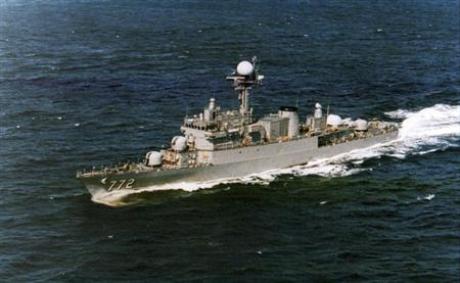Military divers have searched in vain for 46 marines missing since a South Korean ship exploded and sank near the tense maritime border with North Korea, AP reported.
The exact cause of the explosion was unclear, but North Korea did not appear to be to blame. Families voiced their anger Saturday as hopes faded for the missing crew in one of South Korea's worst naval disasters.
Divers tried twice to get to the wreckage, Rear Adm. Lee Ki-sik of the Joint Chiefs of Staff told lawmakers.
The explosion late Friday tore open the rear hull of the Cheonan, shut down its engine, wiped out power and caused the ship to sink a little over three hours later, the Joint Chiefs said.
A survivor, Staff Sgt. Shin Eun-chong, 24, told relatives he was on night duty when he heard a huge boom behind him that split apart the ship. The vessel started tilting, and his glasses fell off his face as he hit the deck, relatives at a naval base in Pyeongtaek told The Associated Press.
Military planes and boats searched the waters near South Korea's Baengnyeong Island where the 1,200-ton Cheonan had been on a routine patrol. Rescue efforts Saturday were hampered by fierce waves and high winds.
Fifty-eight of the crew of 104 were rescued, with some treated for burns and broken bones.
"Yells and screams filled the air," witness Kim Jin-ho, a seaman who was on a passenger ship bound for Baengnyeong, told cable news channel YTN. "Marines on deck were desperately shouting: 'Save me!'"
Despite early fears of an attack, there was no immediate indication that North Korea - which lies within sight about 10 miles (17 kilometers) from Baengnyeong - was to blame, the Joint Chiefs said. Still, troops were maintaining "solid military readiness," Vice Defense Minister Jang Soo-man said.
Earlier Friday, North Korea's military had threatened "unpredictable strikes" against the U.S. and South Korea in anger over a report the two countries plan to prepare for possible instability in the totalitarian country.
The ship went down near a disputed maritime border that has been the site of three bloody skirmishes between the Koreas, which remain in a state of war because their three-year conflict ended in a truce, not a peace treaty, in 1953.
President Lee Myung-bak ordered officials to make all efforts to rescue the crew, spokeswoman Kim Eun-hye said.
"I can only imagine how much shock and pain the missing marines' families must be in," he said late Saturday, according to Kim.
Authorities have not confirmed any deaths, but Rear Adm. Lee told lawmakers he presumed most of the missing sailors were trapped inside, the Yonhap news agency said.
Joint Chiefs spokesman Park Seong-woo said the military will determine the cause of the accident after salvaging the vessel.
That could take weeks. In 2002, it took 17 days to salvage a 130-ton vessel struck in a surprise attack by North Korea, the Joint Chiefs said.
Cmdr. Jeff Davis, spokesman for the U.S. 7th Fleet in Japan, said U.S. ships were standing ready to help with the search, rescue and salvage operation.
In Pyeongtaek, south of Seoul, wails filled the air as relatives checked a list of missing marines.
"Where are you? Where can you be?" one mother screamed.
Among the missing was a marine who had survived a 2002 naval skirmish with North Korea, Yonhap said.
Many relatives waited for news, their faces buried in tissues and handkerchiefs. However, about 150 people - fed up with the lack of information - pushed their way past armed security guards to confront military officials. They accused authorities of a cover-up, saying survivors told them the Cheonan was leaky and in need of repair.
"Liars!" some screamed, jumping up on the car of the Cheonan's rescued captain as he tried to drive away.
As family members scuffled with guards, some soldiers turned their guns onto the protesting relatives.
"I find this gruesome reality - one where soldiers point their guns at heartstricken families of their comrades in arms - absolutely devastating and regrettable," said Chung Hae-kyung, 65, father of a missing lieutenant.
The sinking is one of South Korea's worst naval disasters. In 1974, a ship sank off the southeast coast in stormy weather, killing 159 sailors and coast guard personnel. In 1967, 39 sailors were killed by North Korean artillery.






